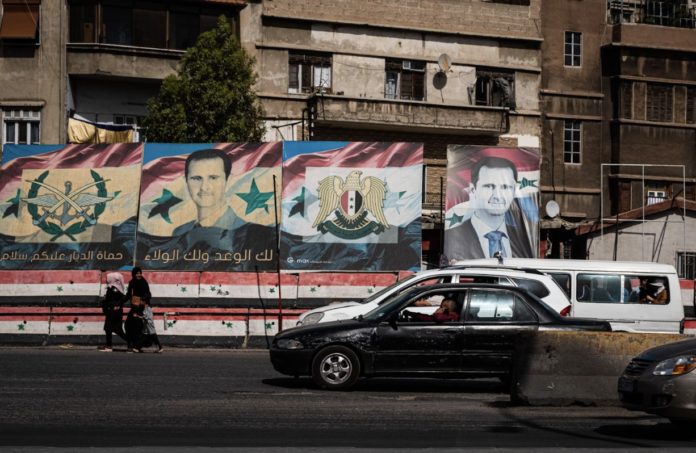![]()
On May 19, Middle Eastern leaders welcomed Syrian President Bashar al-Assad to the 32nd Arab League Summit in Jeddah, Saudi Arabia. The Arab League revoked Syria’s membership in 2011, after he cracked down on pro-democracy protestors during the Arab Spring. The summit in Jeddah is Assad’s first meeting with the Arab League since his suspension. His re-entry marks a shift in thinking about the Assad regime among Arab states, and perhaps a shift away from Western influence on Middle Eastern affairs. It appears that Arab leaders may overlook Assad’s history of international infractions and domestic oppression, previously a diplomatic sticking point, in the service of a cooperative future for regional diplomacy.
Since 1971, the Assad family has run an authoritarian, clientelist regime in Syria, which favored family members and close associates. When Bashar al-Assad succeeded his father in 2000, he promised market reform and prosperity. These promises never materialized, but he has remained in office since.
In 2011, a group of boys painted pro-democracy graffiti in Daraa. They were subsequently arrested and tortured by the regime. The Syrian people reacted to this treatment with shock and outrage. Protests initially focused on the harsh treatment of the boys at the hands of the authorities, as well as requests for the release of political prisoners and greater civil liberties, but later shifted to focus on the regime itself. In response, Assad cracked down on protestors with brutal force. As violence increased, rebel groups armed themselves, further escalating the conflict. The emergence of Islamist hardline groups, such as the Islamic State and the interference of foreign powers in the civil war complicated the already volatile Syrian landscape.
Today, the Assad government controls most of Syria, except for certain rebel held areas in the North. To date, the Syrian civil war has resulted in 307,000 civilian deaths and at least 5.5 million displacements, bringing economic ruin to Syria. Assad has perpetrated assaults on the human rights and dignity of his citizens. He has withheld crucial aid from rebel-held areas and launched chemical attacks against his own citizens.
The Arab League suspended Syria’s membership in response to Assad’s crackdown on the 2011 protests. Other Arab states were wary of the influence of Assad’s Iranian allies, as well as the encroachment of Islamist groups into the civil war. Saudi Arabia and Qatar were most vocally opposed to the Assad government, calling for regime change in Syria, and saying there was no place for Assad in the transition. Arab diplomats called Assad a war criminal and condemned his actions in the war.
As the conflict wore on, the United Arab Emirates moved first to normalize relations with Syria, motivated by a wish to minimize foreign influence in the region, particularly from Russia, Iran and the Lebanese group Hezbollah, which supported the Assad regime. Conversely, the United States and other Western nations supported rebel groups and joined Turkey in conducting airstrikes against Islamist groups.
Assad’s return to Arab diplomacy is an important personal political win. Syria is desperately in need of international aid, in the wake of the earthquakes which decimated Syrian and Turkish cities earlier this year, combined with the economic crisis incited by the war. This aid may now be within reach, thanks to friendlier relations with Syria’s wealthier neighbors.
The decision to allow Syria back into the Arab League was a reversal for the Arab governments who formerly called for Assad’s removal. They reengaged with Assad in spite of opposition from the West and from Qatar, a member of the Arab League.
Following Assad’s return to Arab diplomacy, the problems which plague Syria’s relations with the rest of the Arab world through the last decade must be faced in a different framework. Crucially, the issues to be faced include the question of displaced Syrians abroad and the prevalence of drug smuggling across the Syrian border. Influxes of Syrian refugees have redefined political discussions in nations throughout the Middle East and the West, bringing questions of structural capacity and societal adaptation, exacerbating existing rifts in societies and creating new cleavages. Years after violence forced them out of their homes, many Syrians are still unable or unwilling to return to a nation run by an authoritarian regime. Leaders want to find workable solutions to the refugee problem caused by the Syrian civil war and will be hoping to work in collaboration with Assad towards that goal.
Some leaders allege that Assad has facilitated the production and trafficking into Iraq and Jordan of the highly addictive drug captagon. This, and the question of war refugees, could have been conditions for readmission into the Arab League, as proof that Assad had changed his ways, and would be willing to cooperate with other leaders to forge stronger regional partnerships. Assad has not faced prosecution for his war crimes, which Arab leaders once redressed him for. Instead of using Arab League membership as a bargaining chip, politicians have created a space to collaborate with Assad for the future of Syria.
The question remains as to why politicians have allowed him back into the fold with what seems to be minimal challenge. It likely signals a shift in how Arab leaders view Assad. Led by Saudi Crown Prince Mohammed bin Salman, they now appear to be pursuing an agenda of regional cooperation, as opposed to regime change. Where they had once hoped to see Assad toppled, perhaps they now see engagement as the more pragmatic choice to deal with the problems which face Syria and the Middle East. It is also possible that influential actors, particularly Saudi Arabian leaders, hope to decrease Iran’s regional influence through Syria, and are pursuing that goal by creating a relationship with Assad.
Whatever the reasoning, Assad’s re-entry into the international community is likely to have wide-reaching ramifications. Firstly, leaders in Jeddah emphasized regional unity in speeches, reflecting the actions of recent months. Thawing relations between Saudi Arabia and Iran, and now outreach to Damascus, signal efforts to strengthen bonds between neighbors and lessen reliance on Western powers.
However, this thaw may have wider consequences. Even in the face of the well-known atrocities committed in service of Assad’s regime, and his historic unwillingness to accept democratic trends from within his country, he continues to be accepted back into international rapport. This acceptance is in spite of his minimal recompense for his crimes against his citizens and breaches of international law, and lukewarm promises to conform to global norms in the future.
The Arab League opens the door to Assad’s efforts to normalize relations with other nations. It sets a worrying precedent for the treatment of those leaders who break international codes and standards in their own interests, to the detriment of their nations. One wonders how the pragmatism of allowing men like Assad to normalize diplomatic relations with immunity for their past transgressions may play out in the cases of Russia, Sudan or Afghanistan. The Assad issue is complex, molded by decades of history and the nature of diplomatic relations in the Arab world. It engenders speculation about prospects for the future of diplomacy. Will we hold leaders accountable to democratic norms and international standards, or will we allow them to run roughshod over the laws which protect human rights and dignity across the globe with no repercussions?












